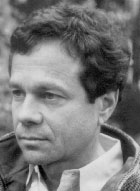As a distinguished theoretical physicist and accomplished writer, Alan Lightman has successfully bridged the gap between science and the humanities. At 4 p.m. Wednesday, Sept. 19, in Graham Chapel, Lightman will provide an understanding of one of the greatest triumphs of the human imagination with the Department of English Hurst Visiting Professorship Lecture, “Einstein and Relativity.” In addition, Lightman will conduct a reading from his work at 8 p.m. Tuesday, Sept. 18, in Anheuser-Busch Hall, Bryan Cave Moot Courtroom.

From an early age, Lightman has pursued two passions: science and the arts. While in high school, he began independent science projects and writing poetry.
His first novel, “Einstein’s Dreams” (1993), was an international bestseller and has been translated into 30 languages. It is an account of the unconscious musings of a young Einstein on the verge of a great discovery, exploring many different psychological perceptions of space and time.
More than two dozen independent theater and musical productions have been based on “Einstein’s Dreams.” One of the most widely used books on college campuses, Lightman’s novel was the 2007 selection for Washington University’s Freshman Reading Program.
Lightman received a bachelor’s degree in physics from Princeton University in 1970, Phi Beta Kappa, and a doctoral degree in theoretical physics from the California Institute of Technology in 1974. From 1974-76, he was a postdoctoral fellow in astrophysics at Cornell University. He served as an assistant professor of astronomy at Harvard University from 1976-79 and for 10 years was a research scientist at the Harvard-Smithsonian Center for Astrophysics.
In 1989, he became the first professor at Massachusetts Institute of Technology to receive a joint appointment in the sciences and the humanities. In 1995, he was appointed the John E. Burchard Professor of Humanities.
He later co-founded the graduate program in science writing. He also helped create a new communication requirement for all MIT undergraduates to have a course equivalent in writing or speaking each of their four years. He resigned his chair in 2002 to allow more time for writing, and now serves as an adjunct professor of humanities.
His essays and stories have appeared in many national publications. His novel “The Diagnosis” was a finalist for the 2000 National Book Award for fiction.
Among his non-fiction books are “Origins: The Lives and Works of Modern Cosmologists” (with R. Brawer, 1990); “Ancient Light: Our Changing View of the Universe” (1991); “Great Ideas in Physics” (new edition 2000); and “The Discoveries: Great Breakthroughs in 20th-century Science” (2005).
Lightman’s research articles have appeared in The Physical Review, The Astrophysical Journal, Nature and other journals.
He has received numerous awards and honors and is a fellow of the American Association for the Advancement of Science, the American Physical Society and the American Academy of Arts and Sciences.
In 1999, he and his wife, Jean, founded the Harpswell Foundation, which provides educational opportunities to disadvantaged children and young people.
The event is free and open to the public. For more information, call 935-4620 or visit assemblyseries.wustl.edu.